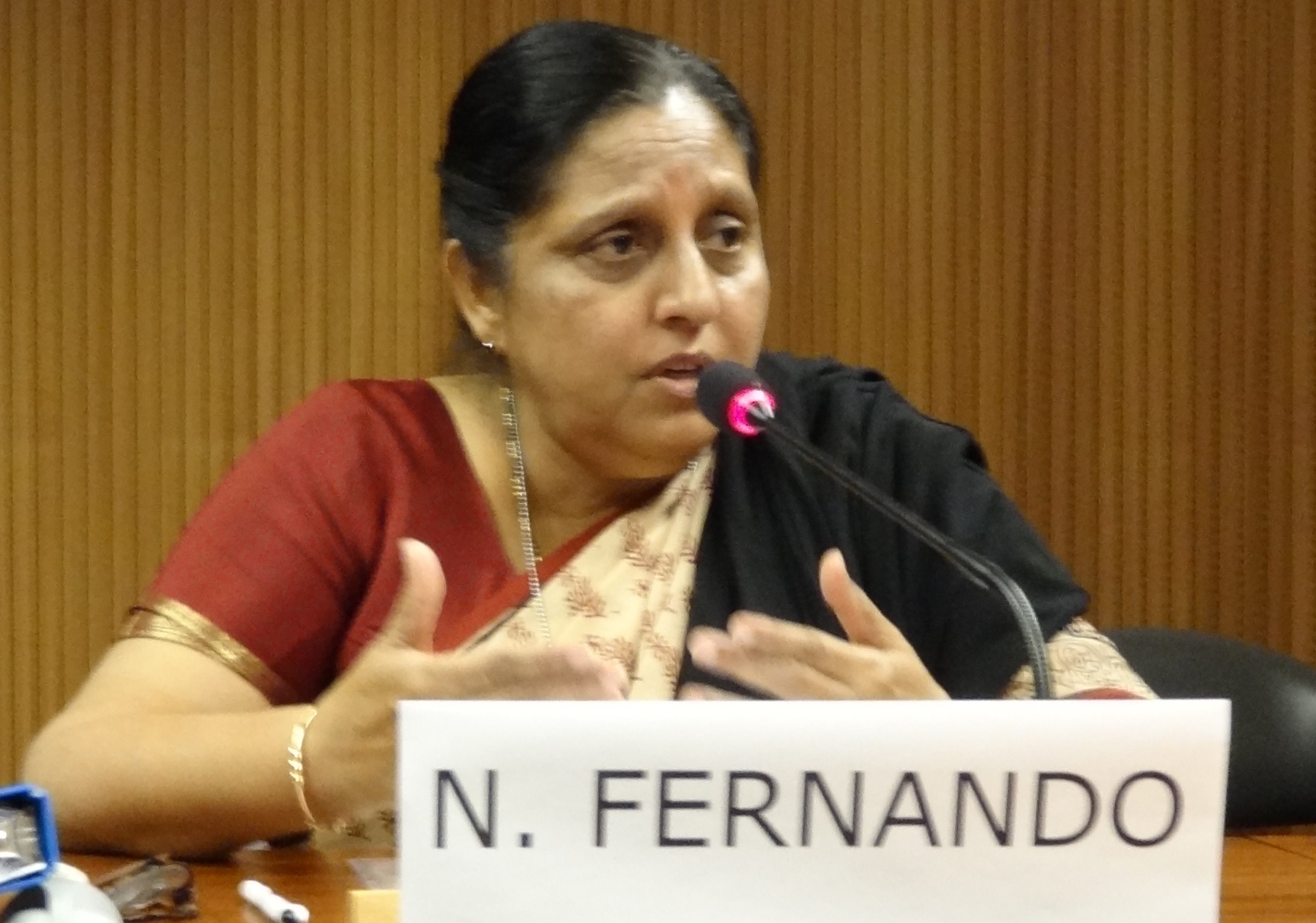Image: Dr. Nimalka Fernando speaking at the side event. ©s.deshapriya.
Speaking at a side event at 36th session of the UNHRC, Dr. Nimalka Fernando, chair of the International Movement Against All Forms of Discrimination and Racism (IMADR) stated that ‘the international promises made by the Sri Lanka government must be absorbed into the UPR to prevent them from running on parallel tracks – accountability must be related to civil, political, economic, social and cultural rights.’
The side event titled “Universal Periodic Review of Sri Lanka”, was organised by the International Movement Against All Forms of Discrimination and Racism (IMADR), jointly with Franciscans International, Minority Rights Group International (MRG) and Human Rights Watch (HRW) . It was held on Tuesday the 27th of September at the place des nations, Geneva.
Speaking further Dr. Fernando said that despite the utility of the UPR, she noted certain weaknesses, mainly that the Sri Lankan Government accepts recommendations but fails to comply with them. Sri Lanka suffered through a war marked by grave violations of human rights, which led to destabilisation of the rule of law and the culture of impunity. Through advocacy, the UPR became a strong tool to keep the issues of accountability, human rights and reconciliation, and grave violations before the UN and the HRC. Now, coming into the next phase of the UPR the political context has changed. Resolution 30/1 was adopted by the HRC, cosponsored by Sri Lanka, and challenges the political leadership to promote a dynamic transitional justice process. The third UPR cycle will focus on the relevance of this process. Dr. Fernando called for the restoration of independent commissions and judiciary. She states that the international promises must be absorbed into the UPR to prevent them from running on parallel tracks – accountability must be related to civil, political, economic, social and cultural rights. Although the current President signed the Office on Missing Persons (OMP) Bill she lamented the slow progress of this body, which causes a loss of confidence of the affected communities with regard to relief and justice. She congratulated the disability organisations that attended the event, as it is the first time that a Sri Lankan disability organisation has come to the HRC. She stated that ‘I’m not afraid to go back to Sri Lanka like I was in 2008, there are no white vans.’ However, she was concerned by the unfortunate rise of extreme Buddhist rhetoric and attacks against Muslims. She believes that it is up to civil society to promote and continue with its critique of governance and to create the frameworks to make the reforms possible.

Speaking from Colombo Dr. Saravanamuttu Paikiasothy of the Centre for Policy Alternatives, stated that the process of transitional justice has made some advances but it is still insufficient to fulfil the commitments made by the Government. The country has attempted constitutional reforms and a report was submitted to the Government by the steering committee, however, there has been no consensus on the structure of the state or how elections will be conducted. Dr Paikiasothy pointed out that nominations for the OMP are still pending. The right staffing and appropriate funding are essential to ensure an operational office. Additionally, an effective communication strategy on the part of the Government is required to inform the population about the Government’s motives and agenda. Without it, the agenda can be instrumentalised by the opposition, which can use this opportunity to misinform the population. He stated that a timeline of constitutional reforms and for the implementation of the three mechanisms stated in Resolution 30/1 should be included in this communication plan.
The event was moderated by Mr J. David Whaley, Former UN Resident Coordinator for Sri Lanka. Three civil society representatives from Sri Lanka, Dr. Nimalka Fernando, Mr. Prasanna Kuruppu and Mr. Freddy Gamage formed the panel.
-Edited version of a longer article published in the IMDAR website.
